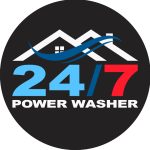Concrete Cleaning: Maintaining Concrete Over The Years
As a home or business owner, you understand the importance of maintaining your property’s infrastructure, and one crucial aspect is the care of concrete surfaces. Concrete is a durable and versatile material widely used in commercial and residential construction. To ensure the longevity and visual appeal of your concrete surfaces over the years, it is essential to implement a comprehensive maintenance plan from the moment it is poured to twenty years down the road. In this article, we will provide you with valuable insights and practical tips on how to take care of concrete to keep it in top-notch condition.
Proper Curing and Initial Care (0-30 Days)
The first 30 days after concrete is poured are critical for its long-term durability. Adequate curing allows the concrete to gain strength and resist cracking. Here’s what you should do during this period:
- Keep the surface moist: Maintain a consistent supply of water to prevent the concrete from drying out too quickly. Use a fine water mist or cover it with damp burlap.
- Avoid heavy loads and traffic: Restrict heavy equipment and vehicle traffic on the concrete during the initial curing phase to prevent surface damage.
- Limit exposure to extreme temperatures: Protect the concrete from freezing temperatures or scorching heat during the curing phase.
Regular Concrete Cleaning and Maintenance (1-5+ Years)
Once the concrete has fully cured, it is essential to implement a regular cleaning and maintenance routine to preserve its appearance and structural integrity:
- Regular Cleaning: Schedule periodic pressure washing to remove dirt, debris, and stains. A professional pressure washing company like our can help you achieve thorough and effecting cleaning without damaging the surface.
- Remove oil and chemical stains promptly: Oil spills and chemical leaks can seep into the concrete, causing ugly stains and weakening the surface. Promptly treat these areas to avoid long-term damage.
- Seal the concrete: Applying a high-quality sealant will help protect the surface from moisture, chemicals, and UV rays, preventing premature deterioration.
Repairing Cracks and Damage (5-10+ Years)
Despite regular maintenance, concrete surfaces may develop cracks or small damages over time. Address these issues promptly to prevent further deterioration:
- Crack repair: Fill and seal cracks using appropriate concrete patching materials. Ignoring cracks can lead to water penetration and compromise the concrete’s structural integrity.
- Joint resealing: If your concrete has expansion joints, ensure they are resealed periodically to prevent water intrusion and potential joint damage.
Reinforcement and Structural Assessment (10-20+ Years)
As your concrete surfaces approach the two-decade mark, it’s essential to conduct a structural assessment and reinforce areas that may show signs of wear and tear. Hire a professional inspector: Engage a qualified structural engineer to assess the concrete’s condition and identify any underlying issues that require attention. If the inspection reveals weak points, take corrective action to strengthen the concrete and extend its lifespan.
Why You Should Hire A Professional Pressure Washer
Professional Pressure Washing for Concrete Care
Caring for concrete surfaces from the moment they are poured is essential to ensure their longevity and preserve their appearance. Regular cleaning, proper maintenance, and addressing any issues promptly will keep your concrete surfaces in optimal condition for up to two decades or more.
Pressure washing is a popular method for cleaning concrete surfaces, promising quick and efficient results. While it may seem tempting for homeowners to take on this task themselves, pressure washing concrete is not as straightforward as it appears. In this article, we will explore the various reasons why people should resist the urge to pressure wash their concrete themselves, highlighting the potential risks and complications that can arise from this DIY approach.
Many homeowners mistakenly believe that DIY pressure washing will save them time and money. However, without the necessary expertise and equipment, the process can be time-consuming and may require multiple attempts to achieve satisfactory results. Moreover, any mistakes made during DIY pressure washing can lead to costly repairs. Hiring professionals not only ensures a more efficient and effective cleaning process but also prevents potential damage and the associated expenses.
Professional Pressure Washing Equipment and Methods are Crucial
Concrete is a sturdy material; however, improper pressure washing can cause irreversible damage. Excessive pressure can erode the surface, removing the protective layer of cement paste and exposing the aggregates beneath. Consequently, this can lead to a rough, uneven texture, and even weaken the structural integrity of the concrete over time. Professional pressure washers have the expertise to assess the condition of the concrete and apply the appropriate pressure to avoid any harm.
Pressure washing requires specialized equipment with varying pressure settings to cater to different surfaces. Without proper training and understanding of the equipment, individuals can easily select the wrong pressure level, leading to unintended damage. DIY pressure washing may also lack the necessary attachments, detergents, and techniques required to clean concrete effectively, resulting in subpar results and wasted time and effort.
By following the guidelines in this article, you can make a significant investment in the long-term health and beauty of your commercial property. Remember, if you ever need professional assistance with pressure washing or concrete maintenance, our team is here to help. Contact us to discuss your needs and create a tailored maintenance plan for your specific residential or commercial property.

